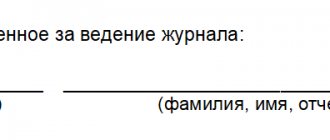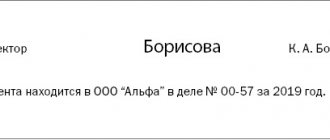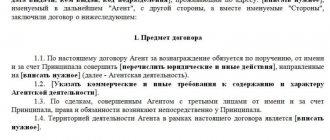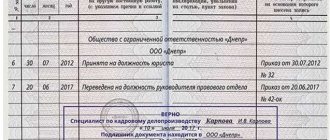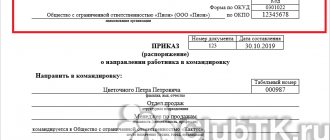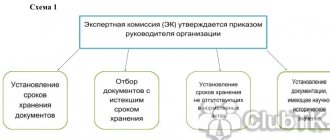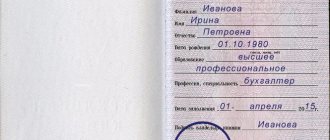Lawyer (and previously also a GIT inspector) Natalya Siverskaya tells what documents can now under no circumstances be required from newcomers, and selects a safe replacement for each prohibited document.
When a company plans to give a new employee a laptop, tablet or phone, an agreement is concluded with him on full financial responsibility for corporate values. The company believes that this is enough to recover damages if it damages or loses things, but this is a mistake.
Transfer and acceptance certificate instead of a liability agreement
The law allows concluding agreements on full financial liability only with employees over 18 years of age who directly service or use the company’s money or valuables (Article 244 of the Labor Code of the Russian Federation). In this case, the employee must either hold a position or perform work from the List approved by Resolution of the Ministry of Labor of Russia dated December 31, 2002 No. 85.
It is impossible to recover from an employee all damages for damage to company property under an illegal agreement on full financial liability. The court will invalidate such a document and will collect only the average salary from the employee. In addition, there is a risk of receiving a GIT fine of up to 50,000 rubles for an illegal contract (Part 1 of Article 5.27 of the Code of Administrative Offenses of the Russian Federation). Therefore, check all your full liability agreements. Terminate contracts that were not concluded according to the rules.
What to replace it with? Transfer laptops, phones and other valuables using a one-time document - an act of acceptance and transfer of property. Draw up such a document with employees with whom you cannot enter into an agreement on full financial responsibility. Draw up a document every time you need to transfer property.
Fines for illegal possession
Officials responded in their own way to the question of whether it is possible to store copies of documents in an employee’s personal file in 2021, but in judicial practice there are already cases when judges considered it unnecessary to store copies with the employer. In particular, the resolution of the Federal Antimonopoly Service of the North Caucasus District dated March 11, 2014 in case No. A53-10287/2013 stated that in order to process the personal data of employees hired, it is enough to verify the information with the originals, and a copy of the passport is not stored in the employee’s personal file must.
It’s up to you to decide whether to include copies of their personal papers in employees’ files or not. Let us only remind you that for violating the rules in the field of personal data, you are fined under Art. 13.11 Code of Administrative Offenses of the Russian Federation. Thus, for processing information in cases not prescribed by law, as well as for processing incompatible with established goals, officials are fined 5,000-10,000 rubles, and organizations - 30,000-50,000 rubles.
In light of the explanations of Rostrud, employers will be fined under clause 2 of Art. 13.11 Code of Administrative Offenses of the Russian Federation. According to it, for processing information without the written consent of the subject of personal data, the fine for officials is increased to 10,000-20,000 rubles, and for companies - to 15,000-75,000 rubles.
Do not make copies of passport pages
When creating an employee’s personal file, copies of the pages of his passport are taken. They do this in order to fill out a new worker’s work book without errors or to check whether the data from the passport was correctly transferred to the personal card. Also, a copy of the passport allows you to find out the employee’s marital status and whether he has children. But such a copy in a personal file can lead to negative consequences for the company and the director.
When hiring, an employee is required to present a passport or other document that proves his identity (Article 65 of the Labor Code of the Russian Federation). The Labor Code does not contain a rule that allows a copy of an employee’s passport to be taken and stored in a personal file. The employee presents his passport so that the personnel officer can verify his identity. Then the passport must be returned to the owner.
note
If a copy of a passport is found in an employee’s personal file, Roskomnadzor will issue a fine of up to 50,000 rubles (Article 13.11 of the Code of Administrative Offenses of the Russian Federation). The court supports this practice of Roskomnadzor. After all, there are no legal grounds for storing a copy of a passport, and storing unnecessary data is prohibited (Article 5 of Federal Law No. 152-FZ of July 27, 2006).
If you want to check the data on your personal card with your passport, do it immediately after the employee fills it out and ask for corrections if you notice any inaccuracies. Fill out the information about your last name, first name and patronymic in your work book from the verified personal card form No. T-2.
NTVP "Kedr - Consultant"
LLC "NTVP "Kedr - Consultant" » Services » Legal consultations » Labor disputes » On the storage of documents in the personal file (personnel) taking into account the requirements for the protection of personal data
Question:
What documents (or copies) should be stored in the personnel (personal) file, taking into account the new requirements for responsibility for personal data of employees
Lawyer's answer
Current legislation provides for mandatory maintenance of personal files only for certain categories of employees (state, municipal employees).
However, the current legislation does not contain provisions establishing obligations for the formation of personal files for commercial organizations. Consequently, the employer (LLC) has the right to manage the personal files of employees independently, determining the procedure for creating personal files and the requirements for their management, taking into account the provisions of the legislation on personal data of employees (Federal Law of July 27, 2006 N 152-FZ “On Personal Data”).
Personal data - any information directly or indirectly related to the subject of personal data - a specific or identifiable individual (last name, first name, patronymic; gender, age; place of residence, etc.), and the processing of personal data means any action (operation) or a set of actions (operations) performed with or without the use of automation tools with personal data, including collection, recording, systematization, accumulation, storage, clarification (updating, changing), extraction, use, transfer (distribution, provision, access), depersonalization, blocking, deletion, destruction of personal data (Article 3 of Federal Law N 152-FZ).
The employer processes the employee's personal data in order to ensure compliance with laws and other regulations, assist employees in employment, training and promotion, ensure the personal safety of employees, control the quantity and quality of work performed and ensure the safety of property. Employees must be familiarized, against signature, with the employer's documents establishing the procedure for processing personal data of employees, as well as their rights and obligations in this area (Article 86 of the Labor Code of the Russian Federation).
At the same time, the procedure for storing and using personal data of employees is established by the employer in compliance with the requirements of the Labor Code of the Russian Federation and other federal laws (Article 87 of the Labor Code of the Russian Federation).
Taking into account the provisions of Art. 88 of the Labor Code of the Russian Federation, the employer transfers the employee’s personal data within one organization in accordance with local regulations, which the employee must be familiar with upon signature. However, labor legislation does not answer the question of which document should establish the procedure for storing, transferring and using personal data of employees. In this regard, it is possible for the employer to adopt a local regulatory act establishing the procedure for storing, transferring and using personal data of employees (regulations, etc.).
{Question: ...Is there an obligation for organizations to take and store copies of SNILS to create personal files for employees? (Expert Consultation, 2017) {ConsultantPlus}}
We also inform you that the current legislation does not establish a list of documents that must be in the employee’s personal file. This list is determined by the employer independently at his own discretion.
{Question: What documents should be in an employee’s personal file? Is a photograph required in a personal file? (“Website “Onlineinspection.RF”, 2017) {ConsultantPlus}}
In our opinion, the list of documents constituting a personal file includes: the employee’s application for employment, a copy of the employer’s employment contract, orders issued in relation to a specific employee in the implementation of labor relations, and his statements, work record book, copies of documents drawn up by the employer when employing an employee for the first time (if this was the case), copies of documents containing personal data of employees (copies of tax registration certificate, certificate of registration in the OPS system, etc.), and other documents related to the work of a particular employee .
{Question: Is the employing organization obliged to maintain personal files of employees? (Expert Consultation, 2012) {ConsultantPlus}}
Thus, the current legislation does not establish the procedure for maintaining an employee’s personal file. In our opinion, the employer has the right to store copies of the employee’s documents (copies of passport, SNILS, work book) in his personal file, provided that he obtains consent from him to store and process personal data.
Selection of documents:
Question: Is the employing organization obliged to maintain personal files of employees? (Expert Consultation, 2012) {ConsultantPlus}
Question: ...Is it possible to store these copies of Russian and foreign passports in the employee’s personal file? Is the employee's consent required for this? (Expert Consultation, 2014) {ConsultantPlus}
Question: ...Is there an obligation for organizations to take and store copies of SNILS to create personal files for employees? (Expert Consultation, 2017) {ConsultantPlus}
Question: Is it possible to store paper copies of an employee’s documents in a personal file: passport, SNILS, work book, etc.? (“Website “Onlineinspection.RF”, 2017) {ConsultantPlus}
Article: Documents with personal data in the archive (Kozhanova E.) (“HR service and personnel management of the enterprise,” 2021, N 7) {ConsultantPlus}
Form: Inventory of documents in the employee’s personal file (filling sample) (Prepared by ConsultantPlus specialists, 2017) {ConsultantPlus}
The explanation was given by Igor Borisovich Makshakov, legal consultant of LLC NTVP Kedr-Consultant, October 2017.
When preparing the answer, SPS ConsultantPlus was used.
This clarification is not official and does not entail legal consequences; it is provided in accordance with the Regulations of the CONSULTATION LINE ().
Commitment not to take up employment with competitors
When a valuable employee leaves, he takes with him not only his experience, but also the company’s secrets. For example, a customer base, contacts with suppliers, etc. A similar situation occurs when such an employee gets a part-time job at a competing company. To protect their secrets, companies take a special document from employees - an obligation not to work for competitors. But in fact, such a document does not protect corporate secrets.
The company does not have the right to prohibit an employee from working in other organizations. The employee decides where to work (Article 37 of the Constitution, Article 2 of the Labor Code of the Russian Federation). Therefore, even a written commitment will not prevent him from quitting and going to work for a competing company, where he will be able to transfer classified information from his previous employer. The court will support the employee if you try to recover damages from him.
Current
Do not enter into liability agreements with inappropriate persons; transfer valuables using a one-time acceptance certificate. Obtain consent from employees every time you need to transfer their personal data to third parties. Do not require an obligation from the employee not to take a job with competitors; it is better to enter into an agreement on non-disclosure of trade secrets.
Instead, enter into a non-disclosure agreement with the employee regarding trade secrets. In the contract, specify the criteria for a trade secret or production secret, the procedure for working with such information, its protection and the conditions of liability for violation. Specify the period during which the trade secret regime is valid, including after dismissal. Also describe the employee’s actions to maintain secrecy after dismissal (Part 4, Article 11 of Federal Law No. 98-FZ of July 29, 2004).
A non-disclosure agreement is a legal document that will protect company secrets. If the employee violates the obligation, the former employer will have the right to demand compensation.
Consent to the transfer of personal data without restrictions
Once an employee is hired, it may be necessary to transfer their personal data to another organization. For example, a security company, a company with which they have entered into an agreement for the transportation of workers, an organization to which they are going to send an employee, and in other cases.
In order not to take written consent from the employee each time, a universal document is prepared. It includes the condition that the employee gives the company the right to transfer his personal data to any organization without exception. But such a document is illegal.
Consent to the transfer of personal data is necessary to comply with the confidentiality regime for employee information. The employee must know and understand what personal data about him, for what purposes and which organization receives (Part 1, Article 9 of the Federal Law of July 27, 2006 No. 152-FZ “On Personal Data”). This requirement cannot be met if there is a universal consent to transfer data to any organization. Obtain written consent from the employee every time you want to transfer his data to third parties.
On a note
If the Roskomnadzor inspector finds consent that allows the transfer of data about the employee to any organizations, he will fine him up to 75,000 rubles (Article 13.11 of the Administrative Code). Therefore, check the personal files of employees. Destroy all universal agreements if you find such documents. This way you will avoid a fine.
It’s better to develop a template for a consent form for the transfer of personal data of employees to other organizations. Include general terms and conditions in the template so you don't have to fill it out every time. Leave blank the lines about the list of personal data, the purpose of data transfer, the name of the organization where you are transferring the data, the employee’s full name, etc. This will allow you to obtain specific consent from the employee each time.
Composition of a personal file: what can and cannot be stored
The composition of the personal file in the personnel department, as well as the list of documents that the organization can store, are not regulated in any way by law. Typically, companies store documents that they create themselves:
- employment contract;
- orders regarding hiring and other events;
- employee profile;
- necessarily a work book.
But even when applying for a job, the employee also brings other documents: diploma, SNILS, certificate of assignment of TIN, passport, military ID. Is it possible to make copies of these documents and also store them in your personal file so that they are always at hand? The legislation and Rostrud clearly say: “no”. Therefore, if a personnel officer does not want to receive a fine, for example, for storing a copy of an employee’s marriage certificate, such papers must be excluded from the personal file and given to employees.
In particular, a violation of the requirements of the Federal Law of July 27, 2006 No. 152-FZ “On Personal Data” will be the storage of any document that is not directly related to the citizen’s work activity. After all, according to the norms of Article 86 of the Labor Code of the Russian Federation:
When determining the scope and content of an employee’s personal data to be processed, the employer must be guided by the Constitution of the Russian Federation, this Code and other federal laws.
This means that the inspection inspector Roskomnadzor, in his own opinion, can determine what is unnecessary. After all, Article 5 of the Federal Law on personal data directly states that personal data should not be redundant in relation to the stated purposes of their processing. It is possible to request third-party documents required in the process (birth certificates of children, marriage certificates, etc.), but storing copies of them is not. At the same time, the courts support this position (Resolution of the Kirov Judicial District of the city of Astrakhan dated May 24, 2012 in case No. 5-244/2012, Resolution of the Arbitration Court of the North Caucasus District dated April 21, 2014 in case No. A53-13327/2013, etc.).
Application for salary payment once a month
When a company wants to save on accounting services, they ask all employees to apply for a salary once a month. In this case, you need to spend half as much time calculating your earnings. The employer’s position is that the employee’s consent is enough to pay wages only once a month. But this is not true.
The law prohibits paying wages less frequently than every half month (Part 6, Article 136 of the Labor Code of the Russian Federation). Specific dates for payment of wages must be specified in the PVTR, collective agreement or employment contract. Wages must be paid strictly on these dates. The exception is that the payment day falls on a weekend or non-working holiday. In this case, the employee must receive the money on the eve of the weekend or holiday (Part 8 of Article 136 of the Labor Code of the Russian Federation).
If you have taken such consent, then you cannot refer to it, it is void. Even if this is the request of the employee himself, and not the initiative of the employer. In any case, this is a violation of the law (Part 6 of Article 136 of the Labor Code of the Russian Federation). Such a violation entails financial liability in the amount of 1/150 of the key rate of the Central Bank for each day of delay in payment of wages and a GIT fine of up to 50,000 rubles (Article 5.27 of the Code of Administrative Offenses of the Russian Federation).
note
Instead of agreeing to pay salaries once a month, you can hire employees under civil contracts. Then you will pay them based on the work completed. Conclude such agreements only if the situation allows you to formalize a civil relationship. For example, an employee is needed occasionally and will perform a new task or new job each time. You will receive a fine if you enter into a civil contract instead of an employment contract. It is also permissible to conclude a civil contract with an employee if he is registered as an individual entrepreneur. Another option is to attract a self-employed citizen.
How does an employment contract differ from a civil contract?
Employment contract. An employee performs a labor function and receives wages from the employer for this. The employer provides tools and equipment to the employee. The employee is subject to the labor regime established by the company and complies with local regulations. Personnel documents are drawn up for the employee and a personnel number is assigned. The employee is obliged to personally perform the duties assigned to him. The employee receives a salary at least twice a month. The salary cannot be less than the minimum wage if the employee has worked the required amount of time and fulfilled his job duties. The employer pays the employee for vacations, sick leave, and other guarantees provided for by labor legislation. As a general rule, the contract is of unlimited duration. The deadline can be set in cases provided for by law.
Civil contract. The contractor performs a one-time job or service and receives a reward for it. Usually the performer does the work using his tools. The customer can provide them if provided for in the contract. The contractor independently organizes his work; local regulations do not apply to him. The contractor is not on the staff of the organization, personnel documentation is not kept for him, and he is not indicated in the time sheet. The contractor can perform the work either personally or with the help of third parties. The contractor receives remuneration in the amount agreed upon by the parties in the contract. The frequency of payments is determined by the parties at their own discretion. The performer is not subject to guarantees provided for by labor legislation. As a general rule, the contract is fixed-term. If the deadline has not been determined, it is valid until the contractor fulfills his obligations and the customer accepts and pays for the work.
Open date resignation letter
When an employer doubts the loyalty of a newcomer, he is asked to submit a letter of resignation with an open date. This allows, in the event of a conflict, to fire an intractable employee on a neutral basis. Also, the work book will not be damaged by a record of dismissal for absenteeism, failure to pass a test, or for other negative reasons.
The law allows you to dismiss an employee for violating labor discipline. The main thing is to follow the procedure for issuing a penalty (Articles 192–194 of the Labor Code of the Russian Federation). And the courts support employers in this. The same applies to dismissal due to failure to pass the test. There is a probationary period for this purpose. At this time, both parties to the employment contract decide whether to continue the employment relationship (Article 70 of the Labor Code of the Russian Federation).
Important
If a GIT inspector finds a statement with an open date in an employee’s personal file, a fine of up to 50,000 rubles cannot be avoided (Article 5.27 of the Administrative Code). When considering cases of voluntary dismissal, courts determine whether the employee really wanted to terminate the employment relationship. If it turns out that the employee wrote a letter of resignation on the day of employment, the court will have the right to reinstate him at work. The company will be obliged to pay the employee a salary for the period of forced absence, and will also have to look for a way to fire him again.
During the probationary period, burden the employee with all types of work that he has to perform, watch how he carries out assignments, record shortcomings, and analyze the reasons for unsatisfactory performance of duties. Do not hesitate to initiate dismissal proceedings due to failure to pass the test - present a notice of failure to pass the test indicating the reason.
Conditions under which it is safe to store copies
In Art. 86 of the Labor Code of the Russian Federation outlines the purposes for which employers are allowed to use and store employee data. They are used for:
- ensuring compliance with laws and other regulations;
- assistance in employment;
- providing education and career advancement;
- ensuring personal safety of workers;
- control the quantity and quality of work performed and ensure the safety of property.
In many organizations, not knowing what documents cannot be kept in an employee’s personal file, they keep copies of passports and other documents according to tradition. And sometimes even after dismissal. Meanwhile, the list of purposes for which employers are allowed to use employees’ personal data and the list of documents that are allowed to be stored in employees’ personal files are closed - copies cannot be used in any other way. For example, a photocopy of a passport will help fill out an employee card, maybe a couple more papers, but then it is no longer needed.
But now an employee is fined “just like that” for storing personal data, and employers have begun to worry: what to do? If the organization needs such information for any reason, in the LNA list what papers are being discussed and stipulate where to store copies of employee documents, obtain consent for their storage, and then be prepared to explain to the inspectors what they are used for.
By the way, the information that a ban was introduced on 9 documents in the personal cards of employees is nothing more than a warning based on the law. But we recommend that you play it safe and remove from your employees’ files those papers that are not needed to fulfill the tasks and responsibilities of the employer.
Specialists from the Federal Service for Labor and Employment emphasize that the storage of copies of passports in an employee’s personal file should be established taking into account the requirements of regulations governing relations in the field of privacy, collection and storage of personal information. According to the provisions of Federal Law No. 152 of July 27, 2006 “On Personal Data,” it is possible to collect, store, use and distribute a citizen’s data only if he himself has given consent to the processing of his personal information.
Commitment to “not get sick”
When an employee is sick, you need to look for a replacement and make changes to the work process. The replacement can be either an internal employee or an outside specialist. In both cases, there is always a risk that the work will not be completed on time or of poor quality. The replacement employee needs time to get involved in the job. Therefore, employees are asked to sign a pledge not to take sick leave. There is a misconception that such a document will keep sick workers in the office.
The employee is obliged to take care of his health, and the state is obliged to support him in this. The risk of illness or injury to an employee at work is insured, the employer pays insurance premiums for it (Article 183 of the Labor Code of the Russian Federation, Part 2, Article 1.3, Clause 1, Part 1, Article 2 of the Federal Law of December 29, 2006 No. 255-FZ). In case of illness or injury, the employee will receive benefits. Therefore, the patient is obliged to undergo treatment so as not to infect others and colleagues (Article 27 of the Federal Law of November 21, 2011 No. 323-FZ).
You will receive a GIT fine of up to 50,000 rubles under Part 1 of Article 5.27 of the Administrative Code if you use the obligation not to take sick leave as a reason not to pay benefits or reduce your salary. You will also pay monetary compensation for delays in wages and benefits. The payment amount is 1/150 of the Central Bank key rate for each day of delay (Article 236 of the Labor Code of the Russian Federation).
Nothing can replace the obligation not to take sick leave. This is the right of the employee, and even a written refusal of it is not valid (Article 9 of the Civil Code of the Russian Federation). There is another way out. Establish a time-based bonus payment system or an allowance for continuous work experience, which includes actual days of work. Write down all the conditions for paying bonuses in the salary regulations.
